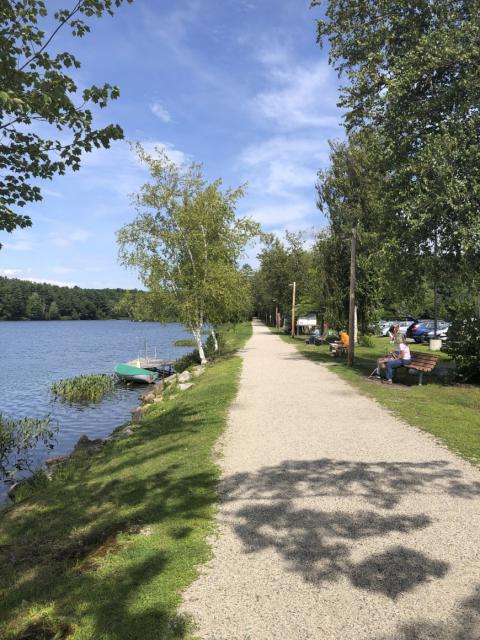COVID-19 Impacts on the Nature Economy

At UNH Extension, we are honored to work with communities across our state on research, programming, and outreach related to the Nature Economy. Anyone familiar with the Granite State knows that we are fortunate to have many natural assets. Our outreach and programming to communities and regions aims to enhance their capacity to leverage and enhance recreational and natural resources. We also conduct research on statewide recreation trends and impacts on the economy by visitors to the state. Nature Economy encompasses how natural capital is connected with built and social capital and used for economic vibrancy in towns and cities. While the Nature Economy can be quite far-reaching, we wanted to share how several aspects have been impacted by COVID-19.
Recent Surge in Nature-Based Recreation
Reports from across the country show that people are turning to the outdoors in large numbers to stay healthy and sane amidst physical distancing requirements. Trails, bikes paths, beaches, and parks are seeing heavy use. Like in other states, communities are seeking to keep these resources accessible in the safest ways possible. While our state beaches and many community parks and playgrounds are closed, fishing and clamming are allowed and most trails and state parks remain open with social distancing guidelines and encouragements to walk and hike locally. Trailfinder offers some suggestions related to Covid-19 and can be a resource for finding local trails . Some local outdoor businesses are reporting steady and even increased business activity, including bike shops and paddle board dealers. Though, they have expressed some concerns about the global supply chains for their products
Impacts of the Pandemic on Tourism 
While The New York Times reports that more than half of states have started to reopen their economies, including beaches and recreational attractions, New Hampshire remains under modified stay-at-home orders through May 31. As we’ve noted, many of the state’s recreational attractions are now open, however, they can only be accessed by members and/or New Hampshire residents. Hotels and inns remain closed indefinitely. While Memorial Day Weekend marks the beginning of New Hampshire’s summer visitor season and has seen more than 650,000 out-of-state visitors in recent years, 2020 will be very different, having severe impacts on travel and tourism revenue for the state’s tourism sector businesses.
The U.S. Travel Association reports that since the beginning of March, the COVID-19 pandemic has resulted in more than $28.8 billion in travel spending losses for the northeast region. In U.S. Travel’s May 6 update on the coronavirus impact on travel spending, New Hampshire is showing a -86% change from this time last year. While these impacts are devastating to businesses and communities reliant on the visitor economy, there is an opportunity to engage in community-based planning as we work to rebuild New Hampshire’s tourism industry to better support communities and protect and contribute to our natural environment.
The Importance of Community Resilience to Long-term Recovery
More important than ever, we are working to understand how and why communities are able to bounce back from challenging situations. When we look at community resilience, we take a holistic view of economic, social and ecological measures, including ecosystem services (the benefits people receive from nature). We can measure resilience with things like industry diversity, social capital, and the presence and use of natural assets. Nature mixed with the built environment in a community can provide a myriad of benefits to us such as space for walking and exercise, flood water retention, water purification, and habitat for plants and animals that we like to view. For instance, many communities have rivers running through them, and this natural feature can be a key component to economic development as it provides space to connect with nature and economic activity. For example, those using downtown riverwalks, historic paths, and community trails can then plan stops at downtown shops for takeout or pickup of meals and goods and services.
What Can Communities Do Now?
We are all adapting to unprecedented circumstances and communities face many challenges. As we look ahead to recovery, communities should continue to view their natural assets as a source of strength and economic vibrancy. One action communities might take is to use this time to inventory and assess their natural assets and visitor infrastructure. Conservation commissions can work with economic development committees to do this kind of assessment and build on existing natural resources inventories.
If your community needs support regarding nature economy or economic analysis topics, please reach out to Shannon Rogers (shannon.rogers@unh.edu).
If your community group, chamber of commerce or business association would like to explore destination development planning to prepare for the reopening of tourism, please reach out to Penelope Whitman (penelope.whitman@unh.edu).
